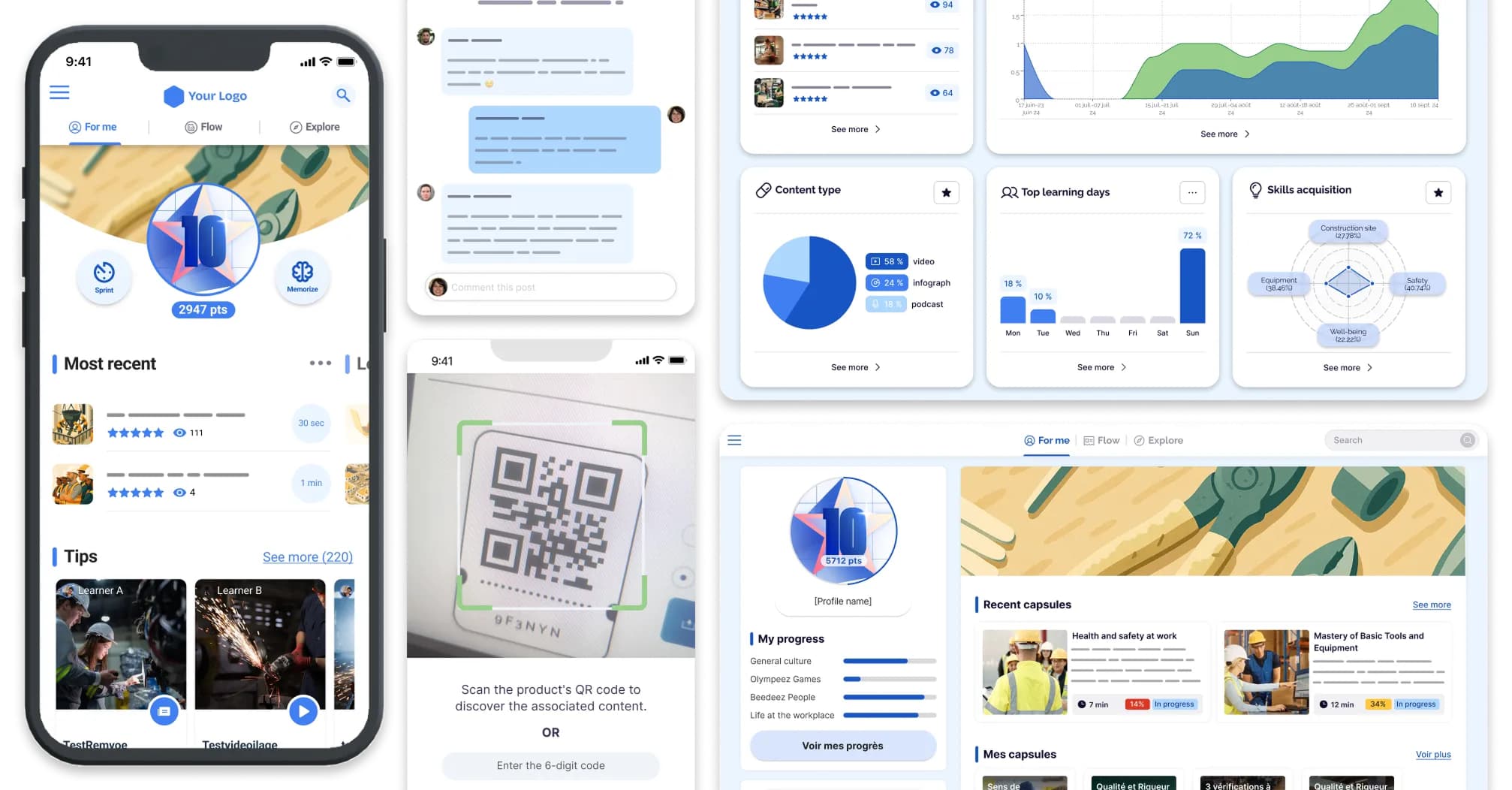In 2023, 59% of businesses have an LMS solution to manage all the training of their employees. This type of platform, ideal for providing a 100% remote course, is increasingly successful and adopted by training managers.
But what is it exactly? And why should you use it in your business? We have deciphered for you!
What is an LMS platform?
Definition and operation of a Learning Management System (LMS)
One LMS, also called Learning Management System is a digital training platform allowing training to be created and organized.
LMS were developed in the early 2000s, at the same time as the emergence of information and communication technologies. Their aim is to centralize training activities automatically. An LMS is aimed at any type of company, or training organizations and schools that want to digitize their training courses. It is used to deploy personalized and interactive training courses for learners.
How and where do you use an LMS platform?
An LMS is divided into 2 interfaces:
- the “administrator” interface: for a manager to personalize and publish the training material
- the “learner” interface: so that the learner can use what the administrator has put online
The user uses an LMS via his computer, his tablet or his mobile phone. This training platform is available at any time and on any interface. The learner connects when he wants, and where he wants!
Cloud LMS vs. local LMS: what's the difference?
There are two types of LMS:
- The LMS hosted on the cloud (or on the internet). An LMS that is hosted on the Internet is not hosted on one of your corporate servers. This means that you need to enter a URL into your browser to access it, and identify yourself using a password and ID. Most of these LMSs are presented in a SaaS (“Software as a Service”) form, i.e. they work with a subscription or subscription system.
- The LMS hosted locally. This type of LMS will therefore be hosted at home, on one of your local servers. You must therefore manage and maintain it internally. But that also has advantages! In fact, you can choose the storage capacity you need and ensure the security of the data yourself.
How do Learning Management Systems (LMS) work?
The LMS offers many features, both to learners and to administrators and trainers.
On their LMS, administrators can:
- Create training materials: most LMSs have a very intuitive authoring tool that allows you to create courses, quizzes, videos and even lives.
- Manage courses or modules: you will have access to a dashboard containing all of your training materials. You can choose to activate or deactivate them, to modify their content or to change their order.
- Assign content to each employee: depending on the training needs of the teams, you can assign certain modules to specific collaborators.
- Follow the results of their training courses: Analytical tables are offered by most LMS to monitor the progress of your learners and the completion rate of your training courses.
Learners, on the other hand, can:
- Access their training path and to the various training materials created by administrators and trainers.
- Track their progress over time, and have a global vision of the development of their skills (quiz results, training courses...)
- Generate feedback for trainers on educational materials or to share specific training needs.
What are the limits of an LMS ?
Why use a Learning Management System (LMS)?
An LMS is very useful for a training manager. He will be able create digital training and evaluations from A to Z and adapted to your needs. In this way, employees will be able to enrich their skills and train for new roles. The training manager can then monitor learners' progress and performance. Training can be developed very easily and in several forms. Adopting the right LMS also makes it possible to maximizing training completion rates.
Be careful though: before choose your LMS platform, it is necessary to realize An audit of the training action to adapt training courses according to the needs of the organization.
The benefits for organizations
Les training management platforms are a major asset for organizations, they allow them to save time and money while training their employees. In particular, an LMS allows you to:
- Manage the rise in skills
- Simplifying administration
- Optimize training costs
- Ensure better monitoring of performance
The benefits for learners
An LMS helps users better remember information learned during training. It is no longer necessary to travel geographically to access training. This is a considerable time saver, but also A gain in commitment. The learner chooses when and where they want to learn. In addition, he can choose his own learning pace. The results of organizations that have implemented LMS are very satisfactory because:
- Learners have a great flexibility and great autonomy
- The training is more Personalized
- The formats are short and fun
- The training is more dynamic, because several training methods are available (virtual classes, elearning,...).
To summarize, a Learning Management System promotes the development of skills through constant interaction.
LMS and the future of online training
Innovations and new educational trends
Since the implementation of LMS in businesses, new training methods have begun to emerge. Among them, Blended learning. Training is no longer only done remotely, but also includes face-to-face sessions.
The “digital learning” section also offers a wide range of new technologies and new learning methods such as:
- microlearning on very short formats;
- mobile learning to learn anywhere;
- gamification with methods borrowed from video games
- social learning for peer-to-peer learning
- interactive learning to learn by participating
LMS vs LCMS: Understanding the difference
Now that we know the LMS, it is interesting to look at the LCMS.
An LCMS is a “Learning Content Management System”, i.e. a “training content management system”. The LCMS, unlike the LMS, is therefore a platform that focuses only on training materials.
The LCMS will therefore allow you to create your training content, but not to share it with your learners, to monitor their learning or to set up a gamification system.
What to remember
- An LMS is essential for managing distance learning.
- It is fully customizable, according to the needs of organizations.
- It allows the company to monitor the increase in skills of its employees by optimizing its training costs.
- Users become autonomous and gain flexibility to develop their skills.
- An LMS also contributes to developing a sense of belonging to the corporate culture.




